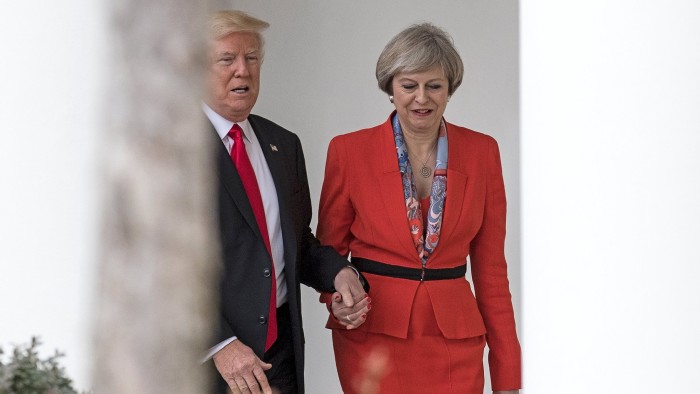Opinion today: Trump and Brexit are no longer twins


This article is from today’s FT Opinion email. Sign up to receive a daily digest of the big issues straight to your inbox.
For the past year or so, mainstream politicians have used “Trump and Brexit” as a shorthand for the forces they are trying to combat.
It is certainly true, notes Gideon Rachman in his column, that the UK's vote to leave the EU and the election of Donald Trump to the US presidency were both populist revolts that mobilised similar constituencies. But at the level of policy, “it has become clear,” Gideon writes, “that Trump and Brexit are not, in fact, identical twins”.
The Brexit vote may have been powered by nativist mistrust of mass immigration from the EU, but Theresa May sees leaving the bloc as an opportunity to forge a “Global Britain”. On a series of policy disputes, the UK has sided with European defenders of the rules-based international order and not with Mr Trump’s vision of “America First”.
For all that some Brexiters in Mrs May’s cabinet talk up the idea of “Anglosphere”, or club of English-speaking nations, with Britain and the US at the centre, the UK’s foreign policy choices suggest that it remains more comfortable with the Franco-German worldview than the American one.
The hypothecation hypothesis: Alarm at the state of the National Health Service is as firmly fixed a feature of British winters as dashed hopes of snow at Christmas or grumbling about rising train fares. But the difference this year, writes Janan Ganesh, is the seriousness with which the idea of a dedicated NHS tax is being taken. There may be problems with “hypothecation” — and the Treasury certainly mistrusts it. But it would at least force politicians to be more candid about spending priorities.
Consciousness and comprehension: An artificial intelligence program recently cracked the second world war German Enigma code in under 13 minutes. What, John Thornhill asks, does this tell us about the cognitive potential of AI? Code-cracking competence is one thing, John argues, but comprehension is quite another. “Computers will find it a lot tougher to crack the consciousness code.”
Counting controversies: The UN describes a census as one of the most significant acts that a state can undertake. It can also be, Anjana Ahuja observes, one of the most controversial. The US census planned for 2020 is a case in point, as the Department of Justice is planning to quiz participants on their citizenship. The DoJ claims this will mean minorities are treated fairly in the voting process, while human rights campaigners fear it is the thin end of nativist wedge. One thing, however, is clear, Anjana concludes: “For people to truly count, they must first be counted.”

The best of the rest
Fire and Fury is a book all too worthy of the president by Masha Gessen in the New Yorker
The Republic is one and indivisible — Jean Baubérot in Le Monde
After Brexit, England will have to rethink its identity — Robert Winder in The Guardian
Cybersecurity today is treated like accounting before Enron — Nathaniel Fick in The New York Times
Has ‘Leave’ really just shot to a ten-point lead? Don’t be so sure — Peter Kellner in Prospect
What you’ve been saying
We are already suffering the damaging effects of AI — from Aron Miodownik, New York, NY, US
“Sir, Paul Weighell’s passionate plea (Letters, January 3) not to toss out the artificial intelligence baby with its digital bath water misses one salient point — we are already suffering from its damaging effects. The US education system uses black-box algorithms to fire teachers, while postcodes have become the dominant attribute for decisions on college entry, credit scoring and parole decisions. Insurance companies deny healthcare to patients without any appeal process, while Facebook acknowledges that its systems were hijacked by paid-for Russian ads during the 2016 presidential election. Algorithms created by corporations and governments are above the law — they cannot be sued.”
Comment from Paul A. Meyers on Rana Foroohar’s latest column, Three trends to move markets in 2018
“At some point in the next several years, environmental risk is going to magnify in importance in asset pricing processes. Environmental risk (do we call it e*) will enter asset pricing models right alongside the interest rate. For example, rising insurance rates and the evaporation of certain types of coverage in certain regions will affect asset prices dramatically. A lesson from the earliest days of capitalism and the rise of maritime insurance on long distance sea trade can be re-stated: no insurance, no large scale, globe-girdling capitalism. So what insurance costs may be the largest question in the next decade. And who has it and who doesn't. (If you can't insure Florida, just what is going to be in Florida?) The amount of insurance in force may become a companion measurement to GDP for measuring national economic weight. Just how will the world be insured in 2030? That will also say something about banking? (Will uninsured collateral trigger the next banking crisis?) Look for footnotes in corporate financial reports describing insurance coverage and future access to coverage.”
Switzerland will be an important market for UK — from David Phinnemore, Northern Ireland
“The UK government’s Brexit white paper noted that Switzerland, for example, was the UK’s sixth most important export market, accounting for 4 per cent of UK goods and services exports in 2014. The white paper was silent on how access to the Swiss and other non-EU European markets would be maintained post-Brexit. That silence has generally persisted, adding to uncertainty. Bilateral and multilateral options, such as membership of or association with the European Free Trade Association (Efta) do exist. The government would do well to consider these publicly.”
Today’s opinion
The case for a special UK health service tax A dedicated levy would force candour on politicians about spending priorities
EM Squared: FDI revival supports Ecuador’s change of direction Greenfield investment shows foreign backing for end to ‘Citizens’ Revolution’
Artificial intelligence and the consciousness code If a computer becomes able to deceive humans, then we may all be in serious trouble
Donald Trump and Brexit are no longer identical twins Britain’s approach to the world more closely tracks the EU than America
Free Lunch: An alternative Brexit model Full rule-taking for goods only could be decent compromise
Opinion today: Three market trends for 2018 Events, at present, have a habit of foxing even the most seasoned commentators
Should the UK government fund new nuclear? The availability of alternatives and the costs are what should decide the matter
The Big Read: US stock markets seek depth in IPO pool Greater access to capital has seen companies stay private for longer. But is this about to change?
Radical Happiness, by Lynne Segal An argument for the power of groups in a world obsessed with individual goals
The Big Read
The Big Read: US stock markets seek depth in IPO pool Greater access to capital has seen companies stay private for longer. But is this about to change?
Comments